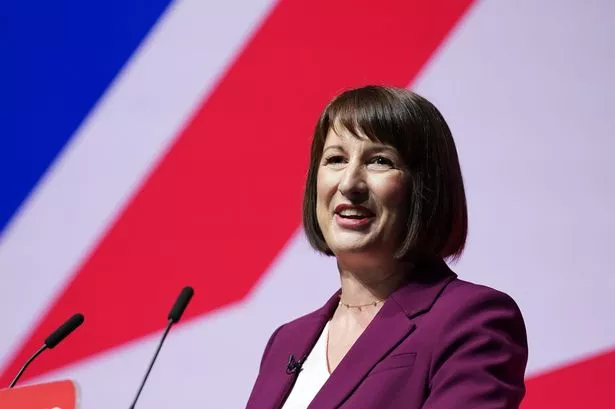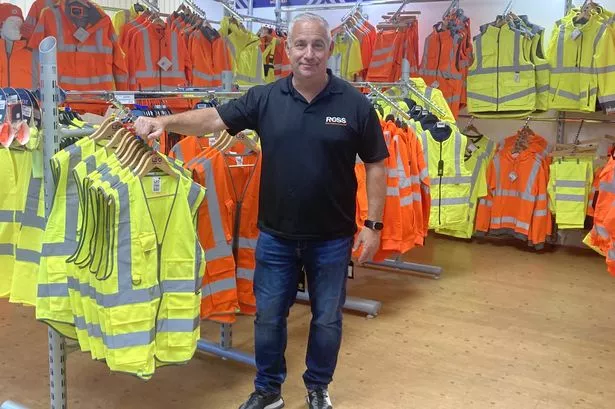North East deals of the week: key acquisitions, contracts and investments

British Airways owners IAG has announced an investment into a Norwegian company which is building a waste tyre recycling plant in the North East.
Wastefront AS – which was launched in Oslo six years ago by former Sunderland University student Christian A. Hvamstad – is creating a complete supply chain for used tyres, through the launch of a £1m plant at Port of Sunderland. Once at full capacity, the Wastefront facility will be ale to process around 80,000 tonnes of tyres per year, turning the used tyres into Sustainable Aviation Fuel (SAF).
IAG says the deal marks another step forward in its commitment to sustainable fuels, while also enabling Wastefront to begin construction on its fully circular tyre-to-fuel facility at the port.
Jonathon Counsell, IAG’s group sustainability officer, said: “We’re proud to support innovators like Wastefront, who are finding new forms of feedstocks to produce advanced fuels. However, as global demand for Sustainable Aviation Fuel (SAF) grows, it’s crucial to expand production in the UK. The recent Government mandate will help reduce aviation’s overall carbon impact, but airlines need confidence that the planned revenue certainty mechanism will support UK businesses in developing SAF technology without further increasing the cost base for UK airlines.”
Property group Northern Trust Company Ltd has snapped up a Northumberland industrial estate in a multimillion-pound deal.
Northern Trust Company, an investment group focusing on property investment, development and strategic land promotion, currently has a portfolio of around 9m sqft of industrial space, trade counters and office parks, as well as more than 5,000 acres of land throughout the UK, supporting over 25,000 jobs. Now the business has bought the South Nelson Industrial Estate in Cramlington, which has 46,683 sqft of workspace across 33 units, set next to Northern Trust’s existing Nelson Park Industrial Estate.
The £5m acquisition takes Northern Trust’s total ownership in Cramlington to around 300,000 sqft in 100 industrial units occupied by a range of local and regional tenants, while also further strengthening its presence in the North East industrial market.
Barry Nelson, regional property director in the North East, added: “South Nelson Industrial Estate is a well-established industrial estate with excellent connectivity, making it an ideal addition to our portfolio. With the diversity in unit sizes, we can cater to a wide range of businesses looking for flexible space to meet their operational needs. We look forward to managing and developing relationships with the existing occupiers on the estate.”
A 200-year-old Northumberland pub famed for its ‘cursed’ window collection was acquired by a pub giant in a seven-figure deal.
The Dirty Bottles in Alnwick has been operating as a pub for more than 200 years, but just over 10 years ago it faced closure when developers had earmarked it to be turned into flats.
Local entrepreneur Mark Jones stepped in to save the building, believed to have been built in the 1600s, and transformed the pub with a number additions, including the acquisition and incorporation of the former Oscars bar at 34 Narrowgate, and the development of adjoining properties 28 and 30 Narrowgate.
Now property agents at Christie & Co have overseen a deal to sell the pub in the multimillion-pound investment deal to Greene King, one of the UK’s leading pub companies and brewers.
The pub used to be called Ye Old Cross Inn but took on its current name in honour of the “curse of the dirty bottles”, a 200-year-old legend which holds that the innkeeper dropped dead while interfering with the bottles in the window. His widow said that anyone who did the same would meet a similar end, so the “dirty bottles” were sealed between two windows and have remained untouched ever since.
Former owner Mark Jones said: “As an Alnwick lad, I am really proud to have transformed what was a derelict, unloved row of buildings into a sympathetically restored and bustling hospitality venue, taking turnover from zero to circa £3,000,000. As well as giving locals and tourists somewhere of real quality to drink, eat and stay, we have also created and sustained around 40 jobs for local people."
Sunderland business Maxim FM has been acquired by a global rival for an undisclosed sum as part of moves to strength its regional presence. Maxim Facilities Management Limited (Maxim FM) provides commercial contract cleaning and facilities management services to public and private sector clients, and already works with a growing number of blue chip corporate clients.
The firm was founded by managing director Graham Conway in late 2010 and has grown revenues from around £5m to £15m over the last 10 years after hoovering up investment to secure commercial and geographical growth, with its workforce growing to more than 1,100 employees.
Now OCS, an Ipswich based leader in facilities management with worldwide operations, has acquired Maxim FM to strengthen its service offering and expand its regional presence across key public and private sector markets. The deal marks OCS’ sixth strategic transaction in the UK over the last 18 months, and follows recent acquisitions of Scottish facilities management specialists FES FM and FES Support Services, which were announced in December last year.
Graham Conway, managing director of Maxim FM, said: “We are confident this partnership will benefit our colleagues and customers alike, and we are thrilled about the future prospects ahead.”
A popular countryside pub bordering County Durham and Northumberland has been snapped up by a growing hospitality group in an undisclosed deal.
The Derwent Arms is a traditional pub, restaurant and hotel in the village of Edmundbyers, set in the North East corner of the North Pennines Area of Outstanding Natural Beauty. The venue has a lounge bar and restaurant, as well as six ensuite letting rooms, a self-catered guest apartment, and a beer garden.
The pub was bought by Inn Hospitality Group back in 2021, triggering a major refurbishment project, creating a new restaurant serving seasonal and local produce which has proved popular among locals and tourists, also helping it to scoop a number of awards. Now the Derwent Arms has been acquired by Valiant Pub Company, a growing hospitality company launched four years ago by Hawthorn Leisure co-founders Gerry Carroll and Mark McGinty.
The Derwent Arms is their fourth pub acquisition through Christie & Co in the region, adding to its recent acquisitions The Keelman Arms, The Heart of Northumberland and The Railway. David Cash, regional director and Marslie McGregor, business agent at Christie & Co handled the sale.
A Newcastle business which has provided props and costumes for blockbuster TV show The Mandalorian and Disney projects around the world has secured a £100,000 investment. Ouseburn-based costume design and props company Orbital FX was officially established last year by husband-and-wife team Luke and Karen Daley, formalising a shared 10-year passion for creating high-quality replicas for costumed events around the globe.
Now Orbital FX has sealed the six-figure loan investment from Creative UK’s Culture and Creative Investment Programme (CCIP), which is delivered in partnership with the North East Combined Authority to provide investment and support for creative businesses and freelancers in the region.
The couple said the investment comes at a crucial growth point, as they plan to expand their equipment and technical team, while also building the company’s brand awareness.
Hartlepool’s ExMesh Engineering says it is set for significant expansion this year following a £500,000 investment.
The metal fabrication company said it will embark on a recruitment drive later this year, as it introduces a range of new services to meet the growing demands of its customers. As a division of The Expanded Metal Company, ExMesh Engineering said it will build on its over a century of heritage with a fresh focus on innovation and growth.
Ryan Pinder, operations manager and head of CI, said: "To support our bold new direction, we have made substantial investments in state-of-the-art machinery, which will enable us to deliver unparalleled precision, flexibility, and capacity in all metal fabrication.
"New services include a top-of-the-line laser cutter which can cut carbon steel, mild steel, stainless steel, and aluminium with extreme accuracy and efficiency, perfect for complex and large-scale projects. We are very proud to be investing and building on the skill and heritage that is grounded in Teesside.”
North East engineering company RWO has won a contract to support the development of the first of a new generation of data centres. The Newcastle firm is providing a package of civil, structural and geo environmental engineering services for the Latos Data Centres hyperscale data centre in Cardiff, a Tier III asset designed to meet the needs of the most demanding global technology companies.
The deal follows the Stockton-based IT services and consulting specialists’ announcement to deliver 40 new data centres across the UK by 2030 , with Cardiff set to be the first one when it goes fully this year.
Managing director Ross Oakley said: “Securing this work is another big step forward for us as we continue to grow our presence in the burgeoning data centre design and build sector. Our involvement through the planning and pre-construction phase, coupled with our in-depth knowledge of highly-specialist industrial and temperature-controlled facilities such as this, has enabled us to bring forward an effective programme of engineering to deliver the project.”
AM Recruitment Limited is planning on expanding its services in the North East, backed by a £2.5m finance facility. The firm has secured the Confidential Invoice Discounting (CID) facility from Cynergy Business Finance to enable it to boost its operational flexibility and "respond effectively to the needs of the engineering and construction sectors".
Based in Billingham, AM Recruitment is a temporary and permanent recruitment firm specialising in the engineering and construction sectors.
Ian Morrison, Director at AM Recruitment, said: “AM Recruitment is growing at pace, so it's important for us to partner with a bank that understands our business, and can work with us to maximise capacity and opportunities. Our relationship with Cynergy Business Finance has already allowed us to achieve our goals and focus on increasing our working capital capacity and growth potential, which will allow us to better serve clients and meet demands of a changing market.”
Dan Burton, director at Cynergy Business Finance, said: “It was obvious at the outset that AM Recruitment is a well-run firm, backed by a solid management team. We are already engaged in potential plans for the future and how best we can support AM Recruitment in their growth journey. We’re looking forward to what comes next for Ian and the team.”
Gateshead-based office technology company SOS Group has struck a deal to help Newcastle Eagles reach their sustainability goals. The firm is supplying Epson heat-free business inkjet technology to the Vertu Motors Aren, new technology which will reduce energy usage and costs for both the basketball club and the Eagles Community Foundation and is already being put to good use.
This season, to reduce its environmental impact and waste, the club moved away from its usual old plastic season tickets to a new digital ticketing app and an innovative recyclable paper solution for physical card.
Recommend


Enterprise
Radiator group Stelrad sees revenues dip below £300m but profits rise
International radiator group Stelrad saw its revenues fall below £300m in what it described as a “subdued” market environment in various parts of the world. The Newcastle company, which has its main manufacturing base in Mexborough, South Yorkshire, has released a trading update for 2024 in which its turnover fell 6% to around £290m. It said revenues had been helped in part by new business grains in a number of countries in the second half of the year, though overall volumes fell compared to 2023. But with increased prices and cost control measures, Stelrad is expecting its adjusted operating profit to come in at around £31.5m, a small increase on last year’s figure and ahead of market expectations. The company highlighted “continued macroeconomic challenges across our geographies”, saying that high interest rates and inflation were continuing to impact on sales on both the new build housing market and other sales. It said it had seen a recovery in volumes in some European countries, but was expecting “continued softness in market conditions, at least through the first half of 2025. It said that trends towards better energy efficiency in housing would help its long-term prospects and it was in a strong position going into 2025. Chief executive Trevor Harvey said: “I would like to thank the Stelrad team for delivering another year of strong growth in profitability. Stelrad’s performance in 2024, particularly in terms of growth in contribution per radiator and proactive margin management initiatives, demonstrates the strength and resilience of our business model, and further underpins our confidence in the group’s prospects. “We continue to focus on our strategic objectives of growing market share, improving product mix, optimising routes to market, and positioning the business effectively for decarbonisation. While 2025 is expected to provide continuing market challenges, the initiatives we have undertaken will mean that our business can meet these challenges and continue to deliver long-term value for our stakeholders.” Stelrad, which can trace its history back to the 1930s, employs around 1,300 people worldwide, with bases in the UK, Italy, the Netherlands, Denmark and Poland. It is the leading radiator seller in the UK, Ireland, France, the Netherlands, Belgium, Denmark and Greece. The company listed in the Stock Exchange in 2021.


Enterprise
Exeter wholesale broadband company agrees merger
An Exeter-based wholesale internet provider has agreed to merge with a rapidly growing Oxford-headquartered operator. FullFibre, which has offices on Pynes Hill, and its in-house internet services provider (ISP) retail company BeFibre, has agreed the deal with Zzoomm, an established full-fibre business. The enlarged group will have one of the largest full-fibre footprints with some 600,000 properties ready for service and over 65,000 customers. The bosses of the merged firms said the move would accelerate growth and boost operational efficiency. It is also hoped the deal could lead on further mergers and acquisitions across the Altnet sector. Matthew Hare, chief executive of Zzoomm, will become executive chairman and James Warner, chief executive of FullFibre, will be group CEO. Mr Hare said: “An enlarged business with the operational and financial infrastructure, benefitting from the economies of scale, as well as a management team with an exceptional track record, we will have an excellent platform to combine with other Altnets in the near future as well as driving organic growth faster.” Mr Warner added: “This merger represents another significant step in our journey. With a shared commitment to delivering transformational full fibre connectivity with exceptional customer experience, this deal strengthens our collective ability to grow even faster and seize new market opportunities." “For FullFibre, this is our second merger and another milestone in our mission to create a 21st-century digital backbone for the nation. Following our recent successful integration with Digital Infrastructure and BeFibre, this next merger further accelerates our ambitions to lead the market and provide unmatched connectivity to homes, businesses, and wholesale partners alike.” The merger is subject to final documentation execution and regulatory approval, expected early in 2025.


Enterprise
ONS chief Sir Ian Diamond confident in UK's rising health-related economic inactivity data
Professor Sir Ian Diamond, the UK’s national statistician, has expressed strong confidence that the UK is experiencing a surge in health-related economic inactivity, despite doubts over data quality. He stated that the Office for National Statistics (ONS) findings on health-related inactivity align with various other figures from the Department for Work and Pensions (DWP) and the NHS, all indicating an increase in inactivity due to ill health, as reported by City AM. According to ONS data, the number of people economically inactive due to ill-health has risen to 2.8 million, up from 2.1 million in the last quarter of 2019. "What we have reported, and what we stay with, is an increase in inactivity linked – not always, but often – to mental ill health amongst young people," Diamond explained. He also noted a "flight from the labour force" among those over 50, attributed to the growing prevalence of cardiovascular, musculoskeletal and mental health conditions. However, the ONS has faced criticism for declining response rates to its key labour force survey, which provides data on employment, unemployment and inactivity in the economy. Independent research by the Resolution Foundation, published in November last year, suggested that as many as 900,000 more people were employed than official figures suggest, implying that the employment rate would be on par with its pre-pandemic level. Huw Pill, chief economist at the Bank of England, has suggested that the Bank’s own work on the topic suggests inactivity has remained fairly constant. In response to questions about his confidence in the inactivity figures, given broader issues with the survey, Diamond asserted, "Please, please, please don’t think I am being complacent. I lie awake at night worrying about this the whole time." He clarified that the Resolution Foundation’s analysis began with a distinct population base compared to the one the ONS used at the time. "It’s a bit like trying to compare Torquay United with Manchester City: Its not a very sensible comparison," he noted. The think tank’s study also entailed certain assumptions regarding self-employment and jobless individuals, which Diamond believed the ONS should not make.


Enterprise
Lake District hotel bought by growing hospitality group Kronen Collection
The owner of Newcastle luxury hotel Jesmond Dene House has expanded its reach by snapping up a Lake District site. The Jesmond hotel was bought by Kronen Hotels Ltd in October 2023 after the owners decided to retire for an undisclosed sum. Now the business, which trades as Kronen Collection, has added to its portfolio through the acquisition of Borrowdale Gates Hotel, a historic country hotel set in three acres of wooded grounds in the Borrowdale Valley, close to Keswick. The 19th Century originally operated as a country retreat for travellers seeking solace while surrounded by Cumbria’s natural beauty, but over the years it has earned a reputation for its fine dining and boutique-style luxury. A spokesman for Kronen Collection, which also operates The Crown Hotel in Wetheral, which has recently been refurbished, and Kilbirnie Hotel in Newquay, said: “We’ve always been passionate about expanding our portfolio with unique properties that offer both charm and exceptional location. "Borrowdale Gates is an outstanding addition due to its rich history, stunning location in the Lake District, and the potential to provide guests with a truly authentic experience in one of the UK’s most picturesque regions.


Enterprise
Impending tax rises temper business confidence - report
The impact of tax rises weighed heavily on Greater Birmingham businesses during the final quarter of 2024, according to newly published research. The report, published by Greater Birmingham Chambers of Commerce for quarter four, reveals concerns among firms following business tax increases announced in the Chancellor's Autumn Budget. This led to a fall in recruitment activity and the significant increase in the number of companies expressing concerns over price pressures. However, there were signs of resilience from the region's businesses, with both domestic and export activity picking up towards the end of the year. Email newsletters BusinessLive is your home for business news from across the West Midlands including Birmingham, the Black Country, Solihull, Coventry and Staffordshire. Click through here to sign up for our email newsletter and also view the broad range of other bulletins we offer including weekly sector-specific updates. We will also send out 'Breaking News' emails for any stories which must be seen right away. LinkedIn For all the latest stories, views and polls, follow our BusinessLive West Midlands LinkedIn page here. The report, produced in partnership with Birmingham City University, revealed 47 per cent of firms increased their UK sales (up by seven per cent in quarter three), although nearly one in five (19 per cent) reported a decrease. Export activity, which lagged behind domestic sales throughout 2024, showed signs of improvement in quarter four, the report says, with 33 per cent of companies reporting an increase in sales, custom and bookings - the highest level since the second quarter of 2023. Meanwhile, data suggests employer cost implications arising from the 2024 Autumn Budget, such as national insurance contributions and minimum wage increases, may have contributed to a tempering of hiring activity. Just 26 per cent of firms expanded their workforce in the period, down four per cent from quarter three and ten per cent since the start of 2024. Less than a third of businesses (30 per cent) expected workforce growth in the coming quarter while just 44 per cent of firms said they were operating at full capacity - the lowest level since the first quarter of 2021 during the pandemic. Business confidence weakened considerably over the last quarter, with just 47 per cent of firms anticipating improved profitability - a decline of ten per cent over the past three months. Concerns over profitability were linked to rising costs forecasted for 2025, with half of businesses surveyed anticipating price increases in the next quarter. Henrietta Brealey, chief executive of Greater Birmingham Chambers of Commerce, said: "In light of the business tax rises announced in the recent Autumn Budget and the introduction of the Make Work Pay programme, it was perhaps no surprise to see a record number of firms expressing concerns around the impact of corporate taxation. "Profitability and turnover projections were also impacted as businesses continue to operate in an uncertain climate.


Enterprise
Chancellor urged to grant BP and Shell tax breaks amid Donald Trump's trade war
Oil giants such as BP and Shell, who operate in the North Sea, should be given significant tax breaks to help protect the UK against Donald Trump’s escalating trade war, Chancellor Rachel Reeves has been advised. The Aberdeen & Grampian Chamber of Commerce is urging the UK government to reduce the 78 per cent tax burden on North Sea oil and gas producers, which also includes billionaire Sir Jim Radcliffe’s Ineos Group, as reported by City AM. The lobby group believes this would be a "key first step towards greater domestic energy security", especially with US President Donald Trump announcing plans to impose import tariffs on Mexico, Canada and China. Trump has also threatened substantial levies on trade with the European Union. The chamber of commerce referenced analysts’ predictions that oil prices could drop if a global trade war impacts demand. The Energy Profits Levy (EPL), a windfall tax imposed on energy production, is in place until 2023. It adds a 38 per cent additional tax rate on oil and gas production, on top of corporation tax at 30 per cent and the 10 per cent supplementary charge. The chamber argues that the tax burden no longer needs to be as high, with "price conditions long having returned to normal levels". The organisation also noted that "UK oil production is now at an all-time low", and gas production is near record lows. Russell Borthwick, the chief executive of Aberdeen & Grampian Chamber of Commerce, has criticised the UK's response to the 2022 global energy crisis, stating: "The UK’s response to a global energy crisis in 2022 ran contrary to all good sense." He added: "Instead of bolstering domestic supply, enabling production from the North Sea and attracting new investment into the North Sea we have become increasingly reliant upon imports." Borthwick also noted that this approach had unsettled the energy sector and its supply chain, undermining confidence at a crucial time for the transition to net zero. He warned: "With the world on the brink of a trade war, we cannot afford to repeat these mistakes." Borthwick pointed out that the UK is already heavily dependent on imported gas from Norway and LNG shipped from the USA to meet our demands. He cautioned: "Any fluctuations in the price of oil and gas could be very damaging in a world where returns on production from the North Sea are already marginal." Borthwick concluded by suggesting that the smart response would be to remove the EPL sooner rather than later – protecting our domestic energy sector and ensuring we’re not putting the UK economy at a significant disadvantage in an increasingly uncertain global context. In related news, last month City AM reported how Shell paid out more than £18.7bn to shareholders in 2024 while cutting spending on renewable energy. The FTSE 100 giant reported a dip in earnings from £23bn in 2023 to £19.1bn in 2024 amid weaker oil prices and lower demand for fossil fuels. Despite a decrease in earnings, Shell announced that it had increased dividends by four per cent in the fourth quarter and unveiled a £2.8bn share buyback scheme, which it anticipates to be completed by its first quarter results for 2025. In the same period, BP revealed plans to cut thousands of jobs across its global workforce as part of cost-cutting measures and efforts to boost its share price.


Enterprise
Crest Nicholson's new strategy aims to tackle housing demand despite profit dip
Despite a lower-than-anticipated profit this year, housebuilder Crest Nicholson has stated it is "well-positioned" to meet housing demand with a new strategy. The company's revenue dropped six per cent for the full year to October 31, landing at £618m, while operating profit plunged 38.4 per cent to £31.3m, as reported by City AM. Profit before tax saw a decrease of 53.3 per cent year on year to £22.4m, and earnings per share fell 60.6 per cent to 5.6p. The firm reported an operating loss of £128.7m for the full year, a stark contrast to last year's profit of £29.9m. This news led to the company’s share price falling nearly five per cent in early trades. Martyn Clark, who took up the role of chief executive in June 2024, described it as a "very tough and disappointing year for the business". Clark revealed he had conducted a "comprehensive review to understand the business, which has included obtaining both internal and external perspectives." He added: "This has allowed me to identify the market opportunity and craft a strategy that will allow us to maximise that opportunity and optimise the company for sustainable growth with an appropriately scaled cost base that will enhance profitability and consistent shareholder value creation." Crest Nicholson has been grappling with a challenging construction environment, with high interest rates, a skills shortage and operational issues all contributing to a "long and frosty winter", according to Julie Palmer, partner at Begbies Traynor. "[However] we may see some green shoots start to emerge as some of these factors stabilise," Palmer added. "Crest needs to demonstrate it can take advantage of the expected uptick in construction." Interest rates have begun to decrease and are predicted to drop further this year, although this has yet to translate into lower mortgage rates as commercial banks remain cautious. The Government is also poised to ease strict planning permission rules, which is widely anticipated to result in an increase in construction, especially if combined with investment in hard-to-find construction skills. "As competition for contracts begins, has Crest’s new leadership created the right environment and structure to grow? Only time will tell," Palmer said.


Enterprise
UK pensions are being 'squandered' warns Phoenix Chief Investment Officer
Phoenix's investment chief has issued a stark warning that the UK's pension wealth is being "squandered" due to market fragmentation and conservative money managers. In an article for City AM, Mike Eakins, Chief Investment Officer at the FTSE 100 pensions firm, highlighted that the UK is an "outlier" in comparison to similar nations, with its pension funds inefficiently spread across numerous small investment vehicles. "We have one of the highest levels of investable pension wealth, but this advantage is squandered by having it split up between thousands of arrangements," he remarked. Eakins also pointed out that the industry's diffuse nature is largely historical and called for openness to change. The comments come as there is a push from both the government and the financial sector to direct pension funds into more productive assets, following a two-decade trend of moving away from equities towards bonds. Despite the UK managing around £5 trillion in pension assets, changes in accounting practices around the year 2000 led to a significant shift from equity investments to assets deemed more stable. The Chancellor is keen on unlocking investment from the nation's pension funds, considering it a crucial aspect of her economic strategy. She has set forth proposals to utilise a £160 billion surplus in 'final salary' pension schemes and aims to streamline the extensive local government pension scheme in the UK. At present, 86 different local government pension schemes manage assets ranging from £300m to £30bn, with each fund being managed by local government officials and councillors. Reeves has pointed to Canada and Australia as models, where pension assets are managed in a few multi-billion dollar vehicles. Eakins suggested that merging the sector into larger combined funds would enable them to "function in a more sophisticated manner", compete with "the very biggest investors for growth opportunities and us[e] their scale to extract the best terms". He also noted that a "conservative" approach to investment decisions meant that funds were "missing out on higher returns available in private markets." He added that a more "dynamic investment approach" would enhance savers’ pension pots and "unlock substantial capital for domestic projects." Phoenix was among several pension money managers to support a pledge in 2023 to direct five per cent of their assets into growth assets by 2030.


Enterprise
GSK boosts 2031 revenue target to over £40bn following robust Q4 results
Pharmaceutical titan GSK has raised its 2031 sales forecast to over £40bn, an increase from the previously projected £38bn, following a stronger-than-anticipated performance in the fourth quarter. The London-listed pharmaceutical behemoth disclosed core earnings per share of 23.2p for the quarter, which, despite being a roughly 20% decline year-on-year, exceeded the analysts' expectations of 19p, as reported by City AM. For the entire year of 2024, GSK reported core earnings per share of 159.3p, marking a 10% rise at constant exchange rates. Turnover climbed by seven percent at constant exchange rates to £31.4bn, or by eight percent when excluding sales related to the Covid pandemic. The company declared a dividend of 16p per share for the fourth quarter, culminating in a total annual dividend of 61p. It anticipates a dividend payout of 64p in 2025. Additionally, GSK revealed plans to return £2bn to shareholders through a share buyback programme over the next 18 months. Looking ahead to the forthcoming year, GSK forecasts turnover growth of three to five percent in 2025, alongside a core operating profit increase of six to eight percent. "GSK delivered another year of excellent performance in 2024, with strong sales and core profit growth driven by accelerating momentum of our specialty medicines portfolio," stated Emma Walmsley, Chief Executive Officer, in a release. "This, together with outstanding phase III pipeline progress, means we expect another year of profitable growth in 2025, and have further improved our long-term outlook, with sales of more than £40bn now expected by 2031." Walmsley also noted increasing R&D investment and new medicines in its Respiratory, Immunology & Inflammation, Oncology and HIV divisions. Despite the better-than-expected earnings, GSK also reported a third decline in profit last year as it was forced to pay nearly £2bn to settle lawsuits over the heartburn drug Zantac. GSK was forced to pay around £1.8bn to settle thousands of cases in US courts in October amid claims Zantac caused cancer.


Enterprise
Double management buyout at workwear companies Dale Techniche and J & K Ross
The new owners of two workwear companies that underwent a double management buyout say the businesses are set for growth. Warrington-based distributor J & K Ross and Nelson-based manufacturer Dale Techniche have been acquired from the Ross family by a management team led by Neil Wilcock. The businesses have nearly 50 staff in total and a combined turnover of £10m. The deal was funded by Close Brothers though the value has not been disclosed. J & K Ross was founded by Jean and Ken Ross in 1976 and supplies safety workwear, protective and hi-vis clothing, uniforms and PPE to clients in sectors from utilities and construction to oil and gas, chemicals and petrochemicals. Its Warrington site includes a retail shop alongside its offices, warehousing, embroidery and printing operations. Lancashire's Dale Techniche makes flame-retardant clothing, racewear and flight wear such as pilots’ uniforms, and health and safety workwear. The business was acquired by the Ross family in 2003. J & K Ross and Dale Techniche will continue to trade as standalone businesses. The buyout team alongside Mr Wilcock includes J & K Ross accounts and logistics director, Sharon Sykes, the company’s purchasing manager, Phil Taylor, customer experience manager, Lisa Robinson and communications and IT manager, Phill Moir-Riches, and Donna Emmott, the operations director at Dale Techniche. Neil Wilcock joined J & K Ross as a sales representative more than 30 years ago and has been managing director since 2020, He said: “Both companies are really important names in their respective industries. It’s very much business as usual, and we look forward to serving the needs of our existing customers and new ones, and working with our trusted suppliers, for many more years while maintaining our high standards of service thanks to our dedicated and knowledgeable team. “We have a great management team who understand the businesses well and we have exciting plans to expand, as there are strong growth opportunities for both companies. “At J & K Ross, we will be looking to add to our product portfolio and expand into new sectors, bringing in additional staff to assist with our strategy. Dale Techniche is a sleeping giant and there is great scope to expand its customer base. “The Ross family was keen that the businesses should be able to build on the extensive knowledge base of the senior staff and the wider team so, despite interest from other parties, they were keen to hand over ownership to the management and ensure there would be continuity. Our fantastic and loyal staff are all very happy with the outcome.” A team from law firm Bermans of corporate partners Charlotte Mills and Laura McMorland, with solicitor Nathan Hughes, advised the management team on the double buyout. Charlotte Mills, corporate partner at Bermans, said: “J & K Ross and Dale Techniche are terrific north west businesses with strong foundations and excellent reputations for their commitment to quality and customer service. “The six-strong MBO team has around 140 years’ experience of working in the companies between them, and it was a genuine pleasure to guide them to completion. “They were great to work with and I am confident that the management team will make a huge success of the acquisitions, powered by their enthusiasm and experience. They have an excellent platform for growth and I wish them every success.” Kirsti Pinnell and Helen Mather at law firm Kuits, and Matt Beckley and Lewis Pearson at DJH Corporate Finance, advised the Ross family. Cole Associates provided corporate finance advice to the buyers.